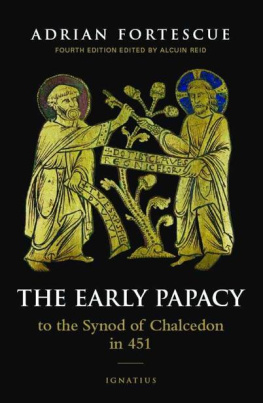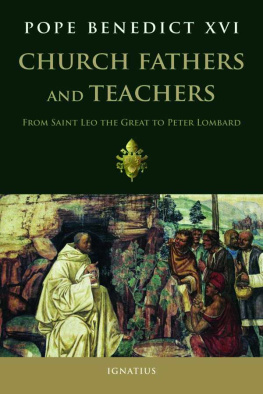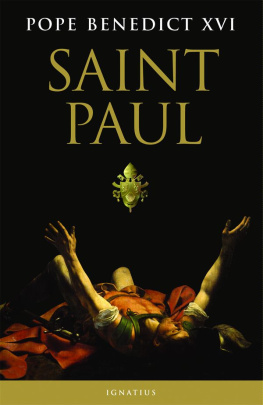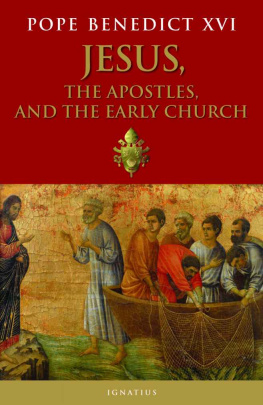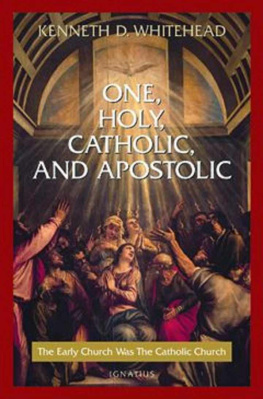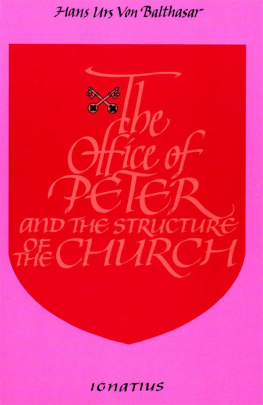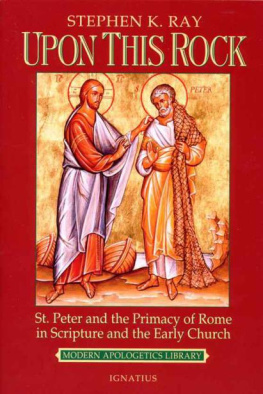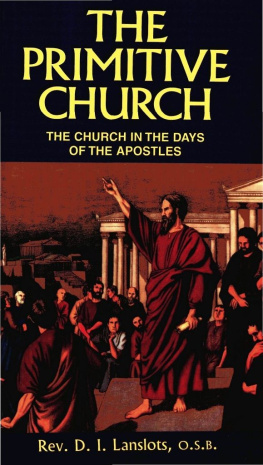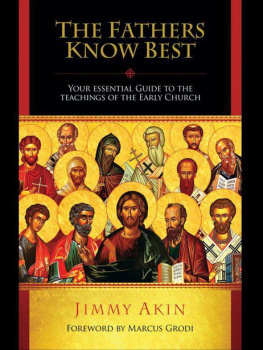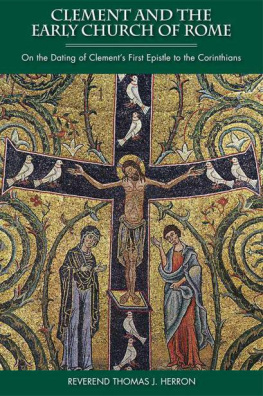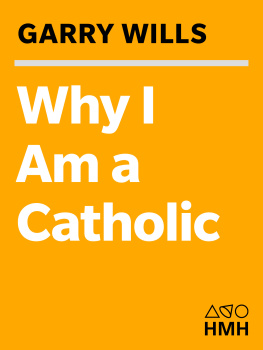THE EARLY PAPACY
ADRIAN FORTESCUE
THE EARLY PAPACY
to the Synod of
Chalcedon in 451
Fourth Edition Edited
by Alcuin Reid
IGNATIUS PRESS SAN FRANCISCO
First edition published by
Burns, Oates and Washbourne
London, 1920
Cover art:
Saint Peter receiving the keys from Jesus
Enamel plaque from a reliquary or altar. England, ca. 1180-1185.
Musee des Beaux-Arts, Dijon, France
Erich Lessing / Art Resource, New York
Cover design by Roxanne Mei Lum
2008 Ignatius Press, San Francisco
All rights reserved
ISBN 978-1-58617-176-6
Library of Congress Control Number 2007927188
CONTENTS
Appendix 1:
Appendix 2:
INTRODUCTION
Adrian Fortescue was born on January 14, 1874. His father was an Anglican clergyman who was received into the Catholic Church in 1871 and who died in 1877. Adrian was educated by the Jesuits at Boulougne-sur-Mer, and at St. Charles College, Bayswater. In 1891 he entered the Scots College in Rome, moving to the Faculty of Theology at Innsbruck University after three years. He was awarded a Ph.D. in Rome in 1894. His spare time was spent traveling and studying various ancient and modern languages, pleasures that became lasting passions.
Ordained a priest by Simon, Prince Bishop of Brixen, at Brixen, on Passion Sunday (March 27) 1898, he completed his studies at Innsbruck the following year. Having passed doctoral examinations in dogma and moral theology, Dr. Fortescue accepted a curacy at the German church in Whitechapel, London. After another curacy in Walthamstow, he was appointed rector of St. Helens, Chipping Ongar, in 1901, returning to Innsbruck in May 1902 for further examinations in Church history, canon law and Arabic. Fortescue resigned his parish later that year, being unable personally to bear the burden of its finances.
During subsequent assignments in Colchester, White-chapel, Enfield, Witham and Maldon, Dr. Fortescue prepared for further examinations in Sacred Scripture and Hebrew; and for his final examination for the prestigious degree of Doctor of Divinity, to which he proceeded in 1905, he submitted a thesis on St. Johns authorship of the fourth Gospel.
Returning to England from a sabbatical year in Syria (1906-1907), he was appointed founding rector of the Catholic parish of Letchworth in Hertfordshire. Here the priest, scholar and extraordinarily gifted man that was Adrian Fortescue flourished. The parish of St. Hugh was a gem, carefully polished by its founding pastor. However, the life of its devoted father was to end all too soon. He died at the age of forty-nine, on February 11, 1923, following an operation for cancer.
In 1919 in the columns of the Tablet , Fortescue vigorously defended the Catholic faith in the divinely instituted office of the papacy as integral to the Church founded by Jesus Christ. Fortescue wrote as an apologist for the papal claims, particularly in the light of the equally vigorous rejection of these by some of his non-Catholic contemporaries. Fortescue collected and revised these articles for publication as a book in 1920.
His forthright style admits of little exception. Reading his work so many years later may at first give rise to concern. In our age, marked by the advance of ecumenism where the tendency is to speak, not of non-Catholics, but of separated brethren or of those in real but imperfect communion with the Church, it is not the done thing to emphasize that which sadly divides Christians. Yet the Catholic Church cannot renounce the papacy. That many followers of Christ in fact do to this day means that there is disagreement over something fundamental. Attempts to resolve this division are to be welcomed.
Reading Dr. Fortescues clear exposition of the faith of the early Church in the papacy today may serve this end. And it may serve to increase the readers knowledge of the Fathers of the Church up to 451. It may even, please God, serve to assist some Christians to seek full communion with the Catholic Church.
In his 1995 encyclical letter Ut unum sint the late Pope John Paul II invited dialogue on the subject of the exercise of the office of the Bishop of Rome in an attempt to heal the divisions between the churches. Any such dialogue must be informed by a sound knowledge of the Churchs teaching on the papacy. The Early Papacy will be of assistance here.
Fortescue wrote within fifty years of the apotheosis of papal authority that is evidenced in the decree of the First Vatican Council entitled Pastor aeternus . His period displayed a tendency to accord an uncritical obedience or even an exaggerated importance to the papacy. Given the widespread undermining of religious certainty in the wake of the so-called Enlightenment, and, in our own day, the internal turmoil faced by Western Catholicism, such a leaning somewhat more heavily on the rock of Peter is an understandable reaction.
It is, nevertheless, a reaction. As such it ought to be examined critically in order to guard against the dangerous error of ultramontanism. The belief that all juridical acts of the papacy, or that the policies or personal preferences of individual Popes have always been, are today, or always shall be right, is erroneous. Our Lord did not promise this to St. Peter and to his successors.
Our age, however, is characterizednay, blightedby the existence of those within the Catholic Church who deny or diminish the papacys legitimate authority to govern the Church
Almost ironically, Fortescues personal correspondence often caricatures and, on occasion, criticizes Popes and the papacy. He could even make light of having a portrait of the Pope:
They
Concerning antipapal reactionaries, he wrote:
I hear about poor Tyrell and Modernism from everybody I speak to now. It occurs to me that most of these people start from a fundamental principle that, if the Pope is down on any mortal thing, that thing must be right. I believe that if Rome condemned highway robbery or wholesale adultery, pious Protestants would begin to think that there is a good deal to be said for them.
Regarding the imposition of the antimodernist oath, he stated:
We have stuck out for our position all our livesunity, authority St. Peter the rock and so on. I have too and believe it; I am always preaching that sort of thing, and yet is it not now getting to a reductio ad absurdum ? Centralisation grows and goes madder every century. Even at Trent they hardly foresaw this kind of thing. Does it really mean that one cannot be a member of the Church of Christ without being, as we are, absolutely at the mercy of an Italian lunatic?... Give us back the Xth century Johns and Stephens, or a Borgia! They were less disastrous than this deplorable person.
Writing to a friend about to travel to Rome, he observed:
There are a lot of fine things in the cities around, the Castelli romani [ sic ], especially Frascati, Marino, Lariccia, Castel Gandolfo, Genzano, Grottaferrata. What is left of the old Roman life is to be found in these. They represent still, more or less, what Rome would be if generations of Popes had not destroyed it, systematically, expensively, thoroughly.... Remember me to the present Ordinary, if you see him. I am told he is a decent man. It was Leo XIII in my time.
On the activity of the Pontifical Biblical Commission, he wrote:
Time was when I was young and had no sense, regnante Leone , that I meant to read the Bible. The various decisions of the Pontifical Biblical Commission have long shown me that Christians had better leave that interesting volume altogether alone. Apparently there is very little you are allowed to say at all.Leo XIII commits himself to the historicity of every statement not obviously a quotation in the Old Testament. That is absolutely and finally hopeless.... It is not that one wants to deny what the Pope has said. On the contrary one has the strongest reasons for wishing to justify them. But on such matters as this, one simply cannot refuse to be convinced by the evidence.... I wish to goodness that the Pope would never speak at all except when he means to define ex cathedra . Then we should know where we are.
Next page
